Social Cognition and Bias Laboratory Page
Research
The Social Cognition and Bias (SCAB) Lab conducts research broadly within the domain of social cognition. Primary research areas include attitudes and persuasion, unconscious thought, automaticity, and the effects of initial expectations on subsequent experiences. Within the attitudes and persuasion realm, our research investigates the influence of action/inaction goals, emotional experiences, individual differences, and non-conscious thinking processes on the extent to which individuals’ attitudes are formed or changed. Our lab also studies emotion-regulation processes, the influence of affect on judgments of familiarity, the influence of familiarity on affective judgments, and the effects of non-conscious emotion on judgments and evaluations. More recently, we have conducted research investigating factors that influence when our expectations for future feelings actually influence our subsequent experiences (e.g., the placebo effect).
About Us
Principle Investigator:
- Dr. Ian M. Handley
Current Graduate Students:
- Lucca Reiter
- Sjon Quinn
Undergraduate Researchers
- Lab Application
Select Representative Publications
-
Handley, I. M., Brown, E. R., Moss-Racusin, C. A., Smith, J. L. (2015). Quality of Evidence Revealing Subtle Gender Biases in Scienceis in the Eye of the Beholder. Proceedings of the National Academy of Sciences, 112(43), 13201–13206. doi: 10.1073/pnas.1510649112
-
Smith, J. L., Handley, I. M., Zale, A. V., Rushing, S., & Potvin, M. (2015). Now Hiring! Empirically Testing a 3-Step Intervention to Increase Faculty Gender Diversity in STEM. BioScience, 65(11), 1084-1087. doi:10.1093/biosci/biv138
-
Manigault, A. W., Handley, I. M., *Whillock, S. R. (2015). Assessment of Unconscious Decision Aids Applied to Complex Patient-Centered Medical Decisions. Journal of Medical Internet Research, 17(2), e37. doi:10.2196/jmir.3739
-
Handley, I. M., Rasinski, H. M., Fowler, S. L., Helfer, S. G., & Geers, A. L. (2013). Beliefs about expectations moderate the influence of expectations on pain perception. International Journal of Behavioral Medicine, 20(1), 52-58.
-
Handley, I. M., & Runnion, B. C. (2011). Evidence that unconscious thinking influences persuasion based on argument quality. Social Cognition, 29(6, Unconscious Thought), 668-682.
-
Albarracn, D., & Handley, I. M. (2011). The time for doing is not the time for change: Effects of general action and inaction goals on attitude accessibility and attitude change. Journal of Personality and Social Psychology, 100, 983-998.
-
Noguchi, K., Handley, I. M., & Albarracn, D. (2011). Participating in Politics Resembles Physical Activity: General Action Patterns in International Archives, US Archives, and Experiments. Psychological Science, 22, 235-242.
-
Handley, I. M., Albarracn, D., Brown, R. D., Li, H., Kumkale, E. C., & Kumkale, G. T. (2009). When the expectations from a message will not be realized: Nave theories can eliminate expectation-congruent judgments via correction. Journal of Experimental Social Psychology,45, 933-939.
-
Albarracn, D., Handley, I. M., Noguchi, K., McCulloch, K. C., Li, H., Leeper, J., Brown, R. D., Earl, A., & Hart, W. P. (2008). Increasing and Decreasing Motor and Cognitive Output: A Model of General Action and Inaction Goals. Journal of Personality and Social Psychology, 95, 510523.
-
Handley, I. M., Lassiter, G. D., Nickell, E. F., & Herchenroeder, L. M. (2004). Affect and automatic mood maintenance. Journal of Experimental Social Psychology, 40, 106-112.
-
Geers, A. L., Handley, I. M., & McLarney, A. (2003). Discerning the role of optimism in persuasion: The valence-enhancement hypothesis. Journal of Personality and Social Psychology, 85, 554-565.

